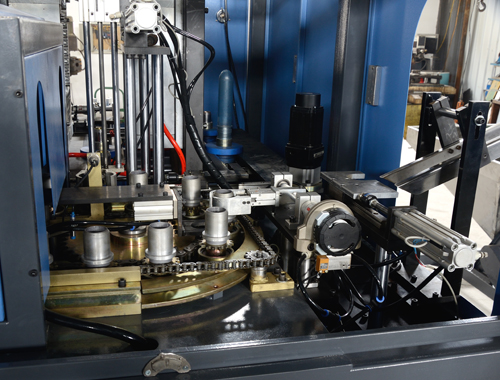With the development of the liquid food market, PET bottles are increasingly used in beverages, dairy products and other industries, which has created a good opportunity for the development of PET packaging machinery. At present, there are two main types of blow molding machines on the market: rotary type and linear type. The two-step production process is basically used: the blanking machine produces preforms, and the blowing machine passes through the blanking, blanking, heating, stretching and pre-blowing. Production of PET bottles by high pressure blowing (or increased cooling), venting and bottle picking. Rotary blow molding machine, high output, good versatility and stability, the same machine can produce different bottle and bottle type bottles, but the price is higher, suitable for customers with higher output; linear blow molding machine, moderate output The price is lower, the compatibility is general, and the bottle with large volume change needs to be equipped with different types of linear machines due to the influence of the structure of the transmission chain, which is suitable for customers with medium and low output.
The following analysis and comparison of the rotary machine blowing machine and the linear machine blowing machine.
First, the layout
Due to the different structure, the layout of the blow molding machine is very different. The rotary blow molding machine consists of four parts: the roughing machine, the warming machine, the main machine and the electric motor. Each part can be separated separately for easy disassembly and transportation, suitable for continuous And high-speed production, blowing direction is positive blowing; linear blowing machine layout is more, one is the main unit and heating concentrated on one frame, intermittent production, blowing direction is blown; one is the host Separate from heating, continuous production can be achieved, and the blowing direction is positive blowing; this layout is the key to increasing production.
Second, production efficiency
There are certain gaps in the production efficiency of the two types of blow molding machines. The biggest advantage of the rotary blow molding machine is the large number of cavities, high output, continuous production, and convenient operation and maintenance. The rotary machine represented by Taizhou Bencheng has a single-mode output of 1500 bottles/hour to 1800 bottles/hour, the number of blow molding cavities is 6-24, and even 30 chambers can be designed. In the future, a single-mode 2000 bottle/hour to 2400 will be developed. The bottle/time high-speed rotating machine strives to narrow the gap in quality, stability and output with similar foreign products. At present, Sidel and other blow molding machines can achieve a single-mode output of 1800 bottles/hour to 2000 bottles/hour, and the stability of the equipment is gradually improved; linear blow molding machines, domestic manufacturers, single-mode output of 800 bottles/hour to 1200 bottles /, the number of cavities is generally 4 to 10, some manufacturers can design 12 to 16 cavities. Foreign Sipa and other all-electric linear machines, single-mode output can reach more than 1500 bottles / hour, structure and layout have their unique side, it is worth studying and learning.
Third, the transmission system
The linear machine is mainly driven by servo motor, the heating chain is used for intermittent movement, and a few cylinders are used to push the heating chain for intermittent movement. During the operation, the origin detection is affected by the accuracy of the chain and the workpiece, and the mold is easy to appear blank or Interference with heating chain; all-electric linear machine, the main unit and heating are driven by servo motor respectively, the synchronism is easy to control; the rotating machine is mostly driven by a geared motor, driven by synchronous belt, synchronously running into and out of the bottle, origin Detection is easier.
Fourth, the formwork structure
Due to the different structure of the two types of models, the structure of the formwork is very different. The frame of the rotating machine is composed of a movable mold frame, a fixed mold frame, a middle mold sleeve and a mold. The movable and fixed mold frames can be opened and closed around one axis. At a certain angle, each set of mold bases generally has one cavity. A few foreign manufacturers can design two to three mold cavities; in order to reduce the rotational inertia, the mold base is light in weight and has sufficient strength. Most linear machine frames are composed of two movable mold frames and two fixed mold frames. The movable mold supports can be moved relative to each other along the guide columns or guide rails. Two to ten mold cavities can be arranged in the middle. The formwork materials are generally Ductile iron or carbon steel welded.
Five, the clamping mechanism
The clamping mechanism is to prevent the mold from rising during the blowing process, and the size of the modulus directly affects the quality of the bottle. Rotary machine clamping mainly adopts bolt type or rotary type clamping, the structure is simple, and the rail is controlled to unlock and lock. In order to reduce the impact, vibration and noise during movement, the curve design of the guide rail should be reasonable; the linear machine clamping mainly adopts hydraulic cylinder or cylinder. Drive, because the connecting rod drives the mold with large mass, it is easy to cause vibration of the equipment during operation, especially the vibration of the opening and closing mold. It is necessary to add buffer of mechanical or hydraulic system to reduce the vibration. The foreign all-electric linear machine is driven by servo motor or cam mechanism. It can realize opening and closing mode once in one rotation. The output can be increased or decreased at any time. The vibration caused by opening and closing the mold is much smaller than that of hydraulic or cylinder drive. The mode is the ideal choice for linear machines.


